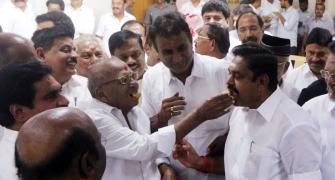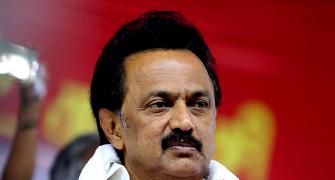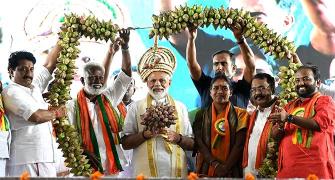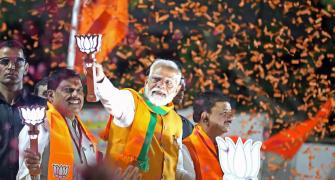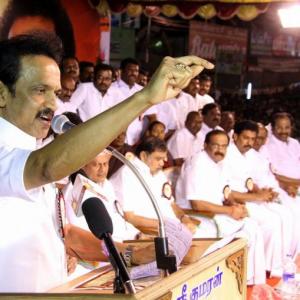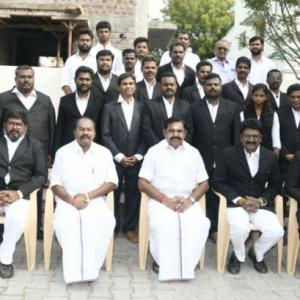Will the AIADMK acknowledge the role of CAA and the anti-CAA protests, both inside the state and outside, as among the causes for the current electoral reversal, as many in the party now want?
It is unlikely to do so, but then the pressure will increase on the leadership to reassess the BJP alliance at one level and the ‘blind support’ for Prime Minister Narendra Modi’s controversial policies on the other, says N Sathiya Moorthy.

The controversial Citizenship Amendment Act has taken the first major electoral toll in southern Tamil Nadu, where the ruling All India Anna Dravida Munnetra Kazhagam has lost the much-delayed rural panchayat polls to the rival DMK.
More than the Opposition parties and independent media houses, second-line party cadres have said as much, over a year ahead of the assembly polls due by May 2021.
With this, the AIADMK has lost the electoral initiative to the DMK twice in the same year after gaining some ground in between. The party had lost the Lok Sabha polls in the company of the BJP, though the latter had swept the same elsewhere across the country in the first half of the year. For the AIADMK, it also meant that the party’s ‘minority government’ in the state could survive after they won nine seats in a total of 22, for which by-elections were held alongside.
Better still, by winning the two assembly seats for which by-polls were held a couple of months later, the AIADMK could convince the state’s electorate, media and national observers that the DMK-Congress combine’s LS poll sweep was just a ‘fluke’.
The rural panchayat polls has now put paid to their unsubstantiated claims and intended insinuations against their electoral rivals.
With results still rolling in from various parts of the state, AIADMK’s former parliamentarian and one-time state minister Anwar Raja attributed the party’s poor showing this time to their voting for the CAB in both the Houses of Parliament. He said that his relatives have lost in their native wards/villages while other reports indicated that it had become not uncommon for the AIADMK nominees to lose.
Over the past couple of decades, elections for both urban and rural local bodies used to be held within months after the assembly polls. The unwritten dictum was that he who won the assembly polls usually swept the local bodies polls, including those for city corporations, whose numbers have been increasing.
However, it was not to be the case after the state voted the AIADMK back to power for a second successive term in 2016. Yet, given party supremo Jayalalithaa’s health and death later in the same year, the AIADMK state government put off the local bodies polls, almost indefinitely.
Post-Jayalalithaa, when the party split under the aegis of her jailed confidante Sasikala Natarajan, and under present-day deputy chief minister O Panneerselvam once in between, the AIADMK lost its stomach for facing the voters. With the DMK and other interested parties moving the Madras high court and the Supreme Court repeatedly, the state government could not delay them any further -- and conducted them with great ingenuity.
Thus, the government divided the local bodies into urban and rural ones and decided to hold the polls only for the latter. Even then, it did not follow the SC dictum to order delimitation based on the latest, 2011 Census figures but had them instead under the forgettable 1991 head count. The latter had become irrelevant with an intervening Census 2001, too.
As if all this were not enough, the AIADMK got a near-unexpected boon when the SC ruled against conducting rural local bodies polls in nine of the 37 districts as they had been created by the creation of five new districts, thus requiring fresh de-limitation for identifying reserved seats and woman-quota wards, unions and district panchayats -- both on a rotational basis. They will now have to be held without much delay. The less said about the urban local bodies, comprising city corporations and town municipalities, the better it may be for the AIADMK -- but not for the state government.
Worse still for the AIADMK, the current results have since shown that the party may not be as strong as it had hoped for in its traditional rural strongholds, as was the case through the MGR and Jayalalithaa eras. This has punctured the cadre morale, after the twin seat assembly by-polls had boosted the same from a disastrous LS poll figures -- both in terms of seats and vote-shares.
The AIADMK’s electoral loss is not comparable to the BJP ally’s in the recently-lost Jharkhand assembly polls. Despite perceptions to the contrary, the Jharkhand polls were halfway through the different phases when the anti-CAA protests began rocking the nation. In Tamil Nadu, it was complete and expanding when the rural local bodies polls came to be held in two phases on December 27 and 30.
For now, even as the current results were rolling out, deputy chief minister OPS acknowledged the poor performance of the party, and said that they accepted the same with all humility. He has also promised that the leadership, which also comprises chief minister Edappadi K Palaniswami, or EPS, would study the results and evaluate the causes for the reversal.
The admission comes after AIADMK second-line leaders had attributed the absence of the last-mile link to the common man as among the major causes for the AIADMK-BJP combine’s poor showing in the Lok Sabha polls. Translated, it also implied that in the absence of civic body elections for three years in row, the ‘money taps’ at their levels had dried up and all that was coming in got diverted to party and bureaucratic higher-ups.
In context, the loss of local body seats -- and more so perceptions of the same -- can impact on cadre morale even more than otherwise. A detailed analysis on a later date when all results became available alone would tell them as to what kind of arrangements would work for them, while they are competing with popular acceptance all over again vis a vis their DMK rivals at the grassroots level.
An interesting aspect of this election is that the DMK, which was demanding early polls and went repeatedly to courts for ensuring the same, seemed reluctant to face the same when they became real. It had more to do with intervening elections through the three years, and a more recent belief that with only a year-plus to go for the assembly polls and the possibility of the state government starving local bodies of funds if the DMK won, the party could become unpopular with the masses ahead of the assembly polls.
Now, the question remains: Will the AIADMK acknowledge the role of CAA and the anti-CAA protests, both inside the state and outside, as among the causes for the current electoral reversal, as many in the party now want? It is unlikely to do so, but then the pressure will increase on the leadership to reassess the BJP alliance at one level and the ‘blind support’ for Prime Minister Narendra Modi’s controversial policies on the other.
It was even so when the AIADMK-BJP combine was swept out near-clean in the LS polls last year. Second-line leaders and cadres alike were believed to have told the EPS-OPS leadership that the unacceptably disastrous results owed to the alliance with the BJP and the ‘unthinking support’ for the Modi overnment’s policies, which were otherwise controversial, to say the least.
Ex-MP Anwar Raja, who has since openly come out on the CAA issue, linking it to the AIADMK’s poor poll showing now, had defied the leadership and had spoken against the ‘triple talaq bill’ when Parliament debated the same. He also voted against it -- and was denied re-nomination. Such voices of concern, though not necessarily of rebellion, is bound to be heard more frequently from now on -- and sooner, so that the leadership would have time to rework its priorities.
In the final analysis, the chances of AIADMK cadres looking elsewhere for medium and long-term electoral succour, just as a common rumour used to begin doing the rounds in and for the rival DMK when Stalin’s ever-estranged elder brother and former Union minister M K Azhagiri was around and active. Their father and pater familias of the party, late M Karunanidhi, settled the issue in Stalin’s favour, when he sacked Azhagiri from the DMK, citing his ‘anti-party activities’ as among the causes for the electoral defeat in 2011 assembly polls.
It is not the case for the EPS-OPS combine within the AIADMK, where pressure may also come upon Panneerselvam to stake his claim -- and those of his one-time loyalists, in party and governmental affairs. EPS began dominating both over a year ago, though the mutual understanding was that EPS will head the government and OPS will have a greater say in party affairs -- though both are designated as co-coordinators, in the place of a strong general secretary, which founder MGR and Jayalalithaa were in their time.
If the EPS-OPS combo could still breathe easy, it owes to the absence of a strong and charismatic competitor from within the party. None is expected to emerge in the foreseeable future, especially after jailed Sasikala’s newphew, T T V Dhinakaran, had a dismal performance in the LS polls, after early promise to the contrary.
Interestingly, Sasikala is expected to serve out her four-year, court-ordered prison term by early 2021, only weeks/months ahead of the assembly polls. Given that her present-day rivals are already well-entrenched in the party and her nephew-led AMMK has come a cropper in the LS polls, the cadres may not have much in store for her, even if she chose to enter direct politics -- unlike when Jayalalithaa was around.
But then, uncannily though from a political point-of-view, income-tax authorities brought her back to the news pages recently, when it was reported that Sasikala had brought properties with thousand-plus crore of demonetised currency, from within her prison cell!
N Sathiya Moorthy, veteran journalist and political analyst, is Distinguished Fellow and Head-Chennai Initiative, Observer Research Foundation.

